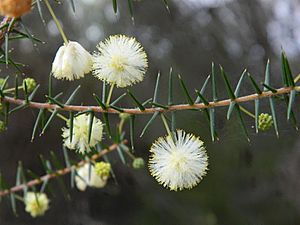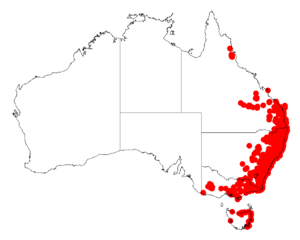Prickly Moses facts for kids
Quick facts for kids Prickly Moses |
|
|---|---|
 |
|
| Flowers and phyllodes of Acacia ulicifolia | |
| Scientific classification |
|
| Kingdom: | Plantae |
| Clade: | Tracheophytes |
| Clade: | Angiosperms |
| Clade: | Eudicots |
| Clade: | Rosids |
| Order: | Fabales |
| Family: | Fabaceae |
| Clade: | Mimosoideae |
| Genus: | Acacia |
| Species: |
A. ulicifolia
|
| Binomial name | |
| Acacia ulicifolia (Salisb.) Court
|
|
 |
|
| Occurrence data from AVH | |
| Script error: The function "autoWithCaption" does not exist. | |
| Synonyms | |
|
|
Script error: No such module "Check for conflicting parameters".
Acacia ulicifolia, also known as prickly Moses or juniper wattle, is a type of shrub. It belongs to the Acacia group of plants. This plant is native to Australia, meaning it naturally grows there.
Contents
What is Prickly Moses?
The prickly Moses is a shrub that can grow in different ways. It can spread out low to the ground or stand tall. It usually reaches between 0.5 m (1 ft 8 in) and 2 m (6 ft 7 in) high. Its bark is smooth and grey.
Leaves and Flowers
The plant has special leaf-like parts called phyllodes. These are short and look like needles. They are about 8 mm (0.31 in) to 14 mm (0.55 in) long.
The flowers of the prickly Moses grow in groups. These groups are called flower heads. Each flower head is attached to a long, thin stalk. This stalk is about 8 mm (0.31 in) to 15 mm (0.59 in) long. The flowers themselves are a pale cream color.
Fruits and Seeds
After flowering, the plant produces a pod. This pod is like a long, thin bean. It measures about 3 cm (1.2 in) to 5 cm (2.0 in) long and 3 mm (0.12 in) wide. The pod is curved and has pinches between each seed.
The prickly Moses usually flowers from mid-autumn to mid-spring.
Why is it Called Prickly Moses?
The name prickly Moses comes from an older name, prickly mimosa. Over time, the name changed to what we use today.
Where Does it Grow?
You can find Acacia ulicifolia in dry forests and woodlands. It prefers sandy soil. This shrub is common in New South Wales, especially along the coast and in the tablelands. It also grows in Queensland, Victoria (Australia), and Tasmania.
 | John T. Biggers |
 | Thomas Blackshear |
 | Mark Bradford |
 | Beverly Buchanan |

